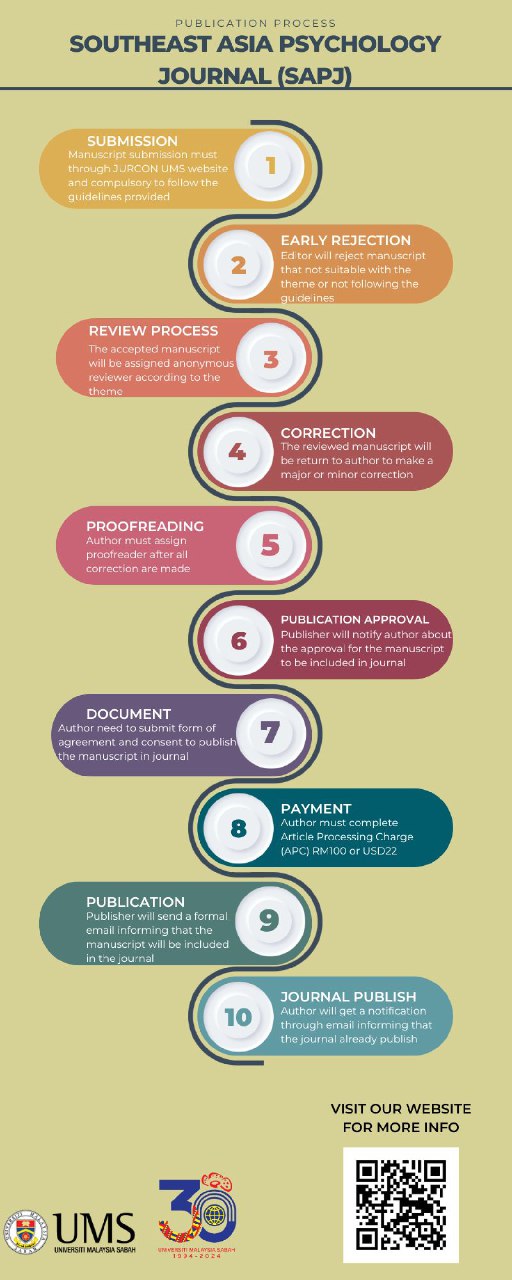THE ROLE OF FATHER’S SELF COMPASSION TO REDUCE PARENTING STRESS ON AUTISM SPECTRUM DISORDER CHILDREN
DOI:
https://doi.org/10.51200/sapj.v9i2.5091Keywords:
Self-Compassion, Parenting Stress, Autism Sprectrum Disorder, Father, ChildrenAbstract
In the process of parenting a child with ASD, mothers always experience stress in the parenting process, but from the results of research and interviews that the father also has the same parenting stress with the mother. Parenting stress due to having a child with ASD can be reduced using coping stress method. Coping source from within someone which is related to their ability in managing the most difficult condition, which can be explained by self–compassion. Purpose of the present study was determining whether there was any relation between Self-Compassion and parenting stress of father with a child with ASD. The research is quantitative approach. This research used Parenting stress by Abidin (1990) and self-compassion Scale by Neff (2003). 105 respondents father with child with ASD from special schools ASD and place therapy ASD as a sample of the population of Bekasi-Indonesia, sampling using purposive sampling techniques. Correlation test results using Pearson correlation show that r = -0.224 (p < 0.05) showed that there was a negative relation between selfcompassion and Parenting Stress. From this research, parent should increasing self compassion to reduce parenting stress of father with a child with ASD.
References
Abidin, R. R. (1990). Introduction to the Special issue: The Stresses of Parenting . Journal of Clinical Child Psychology , 19(4), 298-301, https://doi.org/10.1207/s15374424jccp1904_1.
Bakır, D., & Demirli, C. (2020). Investigation of the Impact of Self-Compassion and Family Support Perception on Parenting Stress in Parents Who Have Children with Learning Disability, Autism Spectrum Disorder and Mental Disability. Humanistic Perspective, 2(3) , 271-282 . https://doi.org/10.47793/hp.794207
Central Bureau of Statistics Republic of Indonesia (BPS). 2016. Jumlah Penyandang Cacat di Indonesia.
Conti, R. (2015). Compassionate Parenting as a Key to Satisfaction, Efficacy and Meaning Among Mothers of Children with Autism. J Autism Dev Disord. https://doi.org/10.1007/s10803-015-2360-6.
Cruz, R. A., King, K. M., Widaman, K. F., Leu, J., Cauce, A. M., & Conger, R. D. (2011). Cultural Influences on Positive Father Involvement in Two-Parent Mexican-Origin Families. J Fam Psychology , 25(5): 731–740. https://doi.org/10.1037/a0025128
Dardas & Ahmad (2014). Psychometric properties of the Parenting Stress Index with parents of children with autistic disorder. Journal of Intellectual Disability Research, 58(6), 560- 571. https://doi.org/10.1111/jir.12053
Desiningrum, D. R. (2016). Psikologi Anak Bekebutuhan Khusus. Yogyakarta: Psikosain.
Febrianto, A. S., & Darmawnti, I. (2016). Studi Kasus Penerimaan Seorang Ayah Terhadap Anak Autis. Jurnal Psikologi Teori dan Terapan, No. 1, 50-61, ISSN: 2087-1708.
Gupta, V. B., Mehrotra, P., & Mehrotra, N. (2012). Parental Stress in Raising a Child with. dcidj.org, 23(2), 2012; https://doi.org/10.5463/DCID.v23i2.119.
Han, Y. S., & Jun, W. P. (2013). Parental Involvement in Child’s Development: Father vs. Mother. Open Journal of Medical Psychology, No. 2, 1-6.
https://doi.org/10.4236/ojmp.2013.24B001.
Hayes, A. S., & Watson, S. L. (2013). The Impact of Parenting Stress: A Meta-analysis of Studies Comparing the Experience of Parenting
Stress in Parents of Children With and Without Autism Spectrum Disorder. Journal Autism Dev Disorder, 43, 629–642. https://doi.org/10.1007/s10803-012-1604-y.
Jia, R., & Schoppe-Sullivan, S. J. (2011). Relations Between Coparenting and Father Involvement in Families With Preschool-Age Children. Developmental Psychology, 47(1), 106–118. https://doi.org/10.1037/a0020802
Kristina, I. F. (2017). Self-Compassion dan Pengasuhan Ibu yang Memiliki Anak dengan Hambatan Kognitif. Jurnal Ecopsy, 4(1). https://doi.org/10.20527/ecopsy.v4i1.3415
Lestari. (2012). Psikologi Keluarga Penanaman Nilai dan Penanganan Konflik dalam Keluarga. Jakarta: Prenadamedia Group.
Mallers, M. H., & Neupert, S. D. (2010). Perception of Chilhood Relationship with mother and Father: Daily Emotional and stressor Experiences in Adulthood. Developmental Psychology, 46(6) 1651-1665. https://doi.org/10.1037/a0021020
Mangunsong, F. (2016). Psikologi dan Pendidikan Anak Berkebutuhan khusus Jilid Kedua. Depok: Lembaga Pengembangan Sarana Pengukuran Dan Pendidikan Psikologi (LPSP3) Kampus Baru UI.
Neff, K. (2003). Self-Compassion: An Alternative Conceptualization. Self and Identity, 2: 85–101. https://doi.org/10.1080/15298860390129863
Neff, K. D., & Faso, D. J. (2014). Self-Compassion and Well-Being in Parents of Children with Autism. Mindfullness, https://doi.org/10.1007/s12671-014-0359-2.
Purnomo, I. D., & Hadriami, E. (2015). Proses Permaafan Diri Pada Orang Tua Anak. Psikodimensia, 14(1), Juli – Desember 2015, 85 - 96 .
Risnawati, E., Nuraqmarina, F., & Wardani, L. M. I. (2021). Peran father involvement terhadap self esteem remaja. Psympathic: Jurnal
Ilmiah Psikologi, 8(1), 143-152. https://doi.org/10.15575/psy.v8i1.5652
Syaiful, I. A., & Roebianto, A. (2020). Adapting and Examining the Factor Structure of the Self-Compassion Scale in Indonesian Version. Jurnal Psikologi, 47, 175 –205. https://doi.org/10.22146/jpsi.57608
Wardani, L. M. I., & Anwar, M. S. (2019). The role of quality of work life as mediator: Psychological capital and work engagement. Humanities & Social Sciences Reviews, 7(6), 447-463. https://doi.org/10.24854/jpu02019-238
Wardani, L. M. I, Jeanne, Y., Mardhiyah, M., Komarudin, A., Istiqomah, & Rozi, F. (2021). Core self-evaluation as a mediator for social support and psychological well-being: A Study of Indonesian migrant domestic worker candidates. Kasetsart Journal of Social Sciences, 42(3), 637-644.
https://doi.org/10.34044/j.kjss.2021.42.3.27
Wardani, L. M. I., Wulandari, S. S., Triasti, P., & Sombuling, A. (2020). The effect of psychological capital on work engagement: Employee well-being as a mediator. Test Engineering & Management, 83, 17220-17229








